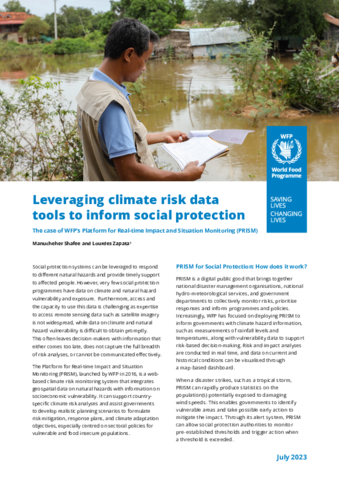
This brief discusses the use of a web-based climate risk monitoring system called PRISM (Platform for Real-time Impact and Situation Monitoring) to enhance social protection systems in the context of climate change and natural hazards. PRISM, pioneered by WFP, integrates geospatial data on natural hazards with information on socioeconomic vulnerability, allowing for real-time risk analysis and visualization through a map-based dashboard. It enables governments to make informed decisions, develop risk mitigation plans, and formulate climate adaptation objectives. The brief highlights the successful implementation of PRISM in Cambodia and its potential to improve the efficiency and effectiveness of social protection and disaster risk management systems by integrating climate hazard information with targeted interventions.
